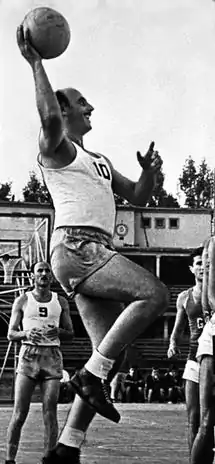Otar Korkia
Otar Korkia (Georgian: ოთარ ქორქია, Russian: Отар Михайлович Коркия; May 10, 1923 in Kutaisi – March 15, 2005 in Tbilisi) was a Georgian professional basketball player and coach. He was named one of FIBA's 50 Greatest Players, in 1991. He was also named the Best Georgian Basketball Player of the 20th Century, and the Best Georgian Sportsman of the 20th Century.[1]
 Otar Korkia, during a basketball game | |
| Personal information | |
|---|---|
| Born | May 10, 1923 Kutaisi, Georgian SSR, Soviet Union |
| Died | March 15, 2005 (aged 81) Tbilisi, Georgia |
| Nationality | Soviet / Georgian |
| Listed height | 1.95 m (6 ft 5 in) |
| Listed weight | 93 kg (205 lb) |
| Career information | |
| Playing career | 1940–1958 |
| Position | Center |
| Number | 7, 10 |
| Coaching career | 1958–1970 |
| Career history | |
| As player: | |
| 1940–1947 | Dinamo Kutaisi |
| 1947–1958 | Dinamo Tbilisi |
| As coach: | |
| 1958–1959 | Soviet Union Under-20 |
| 1959–1968 | Dinamo Tbilisi |
| 1968–1970 | Cambodia |
| Career highlights and awards | |
As player:
As head coach:
| |
Medals
| |
Playing career
Club career
During his club career, Korkia played with Dinamo Kutaisi, from 1940 to 1947, and with Dinamo Tbilisi, from 1947 to 1958.[2] He won three USSR League championships, in the years 1950, 1953, and 1954, and two USSR Cups, in 1949 and 1950.
National team career
Korkia was a member of the senior Soviet Union national basketball team, which won the silver medal at the 1952 Summer Olympic Games. He played in seven games during that tournament.[3] He later became the captain of the senior Soviet national team.
He also won gold medals at the 1947 EuroBasket, the 1951 EuroBasket, and the 1953 EuroBasket. Additionally, he won the bronze medal at the 1955 EuroBasket.
Coaching career
Korkia was the head coach of Dinamo Tbilisi, when the club won the FIBA European Champions Cup (later called EuroLeague) championship, in the 1961–62 season. He was named an Honored Coach of the USSR, in 1967.
Titles won
Player
- USSR League (3): 1950, 1953, 1954
- USSR Cup (2): 1949, 1950
- EuroBasket (3): 1947, 1951, 1953
Head coach
- EuroLeague (1): 1962
Personal life
Korkia's nephew, Mikheil, was also a well-known senior Soviet national basketball team player.
References
- GEORGIA LOSES LEGEND KORKIA.
- Boris Khavin (1979). All about Olympic Games (in Russian) (2nd ed.). Moscow: Fizkultura i sport. p. 306.
- Evans, Hilary; Gjerde, Arild; Heijmans, Jeroen; Mallon, Bill; et al. "Otar Korkia Olympic Results". Olympics at Sports-Reference.com. Sports Reference LLC. Archived from the original on 18 April 2020. Retrieved 15 June 2018.